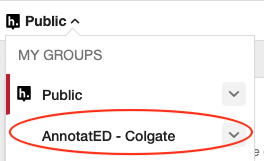Looking back, moving forward, and saying good-bye: Strategies for ending the semester
Greetings Colgate Faculty. Welcome to AnnotatED!
You are seeing this annotation because you have successfully activated Hypothes.is in your browser.
To add your annotations to the private AnnotatED - Colgate space, select the group in the upper left hand corner of the Hypothes.is sidebar.
